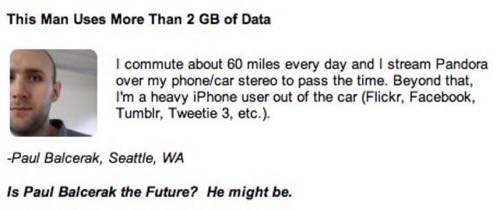AT&T’s announcement that it will begin offering mobile tethering to additional devices for a fee but will stop offering unlimited data plans to new customers is being called cynical and anti-consumer. But the cap is 2 GB a month, with extra GB available for an extra $10 if you go over. Are you concerned this will be a problem?

“The announcement comes at a time,” media watchdog Free Press said in a statement today, “when the company’s investments as a percentage of its revenues are steadily declining, indicating that AT&T is choosing to manage scarcity and ration its network, rather than build to meet users’ needs.” But do users need more than 2 GB a month?
You can see how much data you use by going into your AT&T account and looking at “past activity.” I’m willing to bet you fall far below 2 GB of monthly data usage. But what about a future of live video streaming to and from mobile devices, video chat and unforeseeable data-intensive innovations? All video delivered all over the web? If it’s going to be a data-intensive, mobile and real-time future – it may be time to crank up our expectations and capacity – not limit data available to consumers.
Free Press Policy Counsel M. Chris Riley issued the following statement, which intuitively sounds pretty compelling:
“While AT&T asserts that its high-end 2 GB cap will only impact the heaviest users, the fact is that today’s heavy user is tomorrow’s average user. Internet overcharging schemes like the one AT&T proposes will discourage innovative new uses and stifle healthy growth in the mobile broadband economy. It is price gouging for AT&T to charge the low-end users $15 per 200 MB, and to charge $20 for tethering capability even if no additional capacity is used. This pricing system is clearly divorced from the actual underlying cost of service.
“If there was true competition in the U.S. mobile market, providers would invest in their networks to keep pace with consumer demand, removing the need to implement usage-based pricing plans. The fact that AT&T can introduce an Internet overcharging scheme that bears no resemblance to the cost of operating the network, despite constant complaints about the network’s quality, further demonstrates that our wireless markets are not competitive. Unfortunately, until the FCC takes seriously the need to promote meaningful competition in the wireless industry, Americans will continue to face a market of high prices and poor service.
“This pricing ploy further illustrates why we need the FCC to put an end to the anti-consumer practice of handset exclusivity. For the wireless market to be competitive, consumers must be free to choose both devices and services, and take their devices to any compatible network.”

What do you think? Do you think this is an anti-competitive blow against the future, or do you think a 2 GB limit is just fine for now? Please share your thoughts.
Update: For really excellent coverage of this, see Gigaom today.
Photo by Flickr user magerleagues.

















